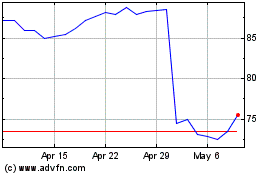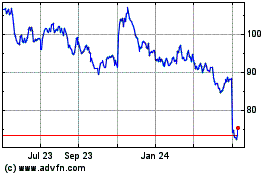GE Warns of Weak 1Q, Pulls Financial Forecasts -- Update
April 09 2020 - 10:36AM
Dow Jones News
By Thomas Gryta
General Electric Co. warned its first-quarter earnings would be
below its prior forecasts and pulled its financial guidance for the
full year, citing the disruptions and uncertainty caused by the
coronavirus pandemic.
The industrial conglomerate is the latest major company, from
FedEx Corp. to Starbucks Corp., to withdraw its financial forecasts
as the rapidly spreading illness disrupts the global economy,
travel and daily life.
GE, which has announced job cuts and furloughs in recent weeks,
said Thursday it expects first-quarter earnings to be materially
below its prior estimate of 10 cents a share. It still expects cash
flow from its industrial operations to be about negative $2 billion
for the March quarter.
"Given the evolving nature of the COVID-19 pandemic, at this
time, GE cannot forecast with reasonable accuracy the full
duration, magnitude, and pace of recovery across our end markets,
operations, and supply chains," the company said Thursday.
GE shares rose 17 cents to $7.47 in early trading. The shares
have fallen about 35% so far this year, compared with a roughly 18%
drop in the S&P 500 index.
Analysts are projecting earnings of 10 cents a share and
negative cash flow of $2.17 billion for the first quarter,
according to FactSet. Wall Street was projecting earnings of 45
cents a share for the year on cash flow of about $400 million.
Before the Covid-19 illness emerged, GE had been restructuring
its operations and trying to pull out of a slump caused by weak
demand for its power generation equipment and troubles in its GE
Capital unit. In recent years, GE had slashed its quarterly
dividend to a token penny per share payout. The company has sold
assets, exiting its transportation and oil division, in order to
pay down its debt.
The company had about $36 billion in cash at the end of 2019,
along with $35 billion in untapped credit lines, according to its
annual report. GE on March 31 closed the sale of its biopharma
division to Danaher Corp. for proceeds of more than $20 billion in
cash.
GE said the disparity between the first-quarter earnings and
cash-flow expectations is because of "non-cash and timing items in
Aviation, Renewable Energy, and GE Capital." The company's Aviation
division makes jet engines for airliners produced by Boeing Co. and
Airbus SE, while its financial services arm has a large airplane
leasing operation.
Last week, GE said it was furloughing half of the U.S. Aviation
manufacturing workers for four weeks, citing growing pressure on
the global aerospace industry from the coronavirus pandemic, which
has grounded thousands of planes.
The move came after GE said on March 23 that it would lay off
about 10% of its U.S. jet-engine workforce, or about 2,500
employees, and furlough half of its maintenance and repair
employees. It said that move would save $500 million to $1 billion
for the year.
"We are taking swift actions across the company to position GE
to come out stronger on the other side of the COVID-19 crisis,"
Chief Executive Larry Culp said Thursday in a press release. He
said the proceeds from the Danaher deal give GE flexibility to
strengthen its balance sheet.
The Aviation division, with about 52,000 workers around the
world, has been hit by the grounding of Boeing's 737 MAX, which cut
GE's cash flow by $1.4 billion in 2019. The division is still
important to GE's turnaround as it produced $4.4 billion in cash
flow last year.
The company is scheduled to report its quarterly results April
29.
Write to Thomas Gryta at thomas.gryta@wsj.com
(END) Dow Jones Newswires
April 09, 2020 10:21 ET (14:21 GMT)
Copyright (c) 2020 Dow Jones & Company, Inc.
Starbucks (NASDAQ:SBUX)
Historical Stock Chart
From Mar 2024 to Apr 2024

Starbucks (NASDAQ:SBUX)
Historical Stock Chart
From Apr 2023 to Apr 2024
